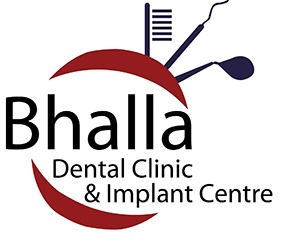
Root Canal Treatment

Root Canal Treatment

Root Canal Treatment
Tooth decay, trauma or cracks can cause the nerves of teeth to die. When this occurs your tooth can often still be saved with root canal therapy. Severe pain, swelling, sensitivity to hot or cold, or a darkening tooth, are signs that a root canal problem exists. The purpose of root canal therapy is to eliminate tooth pain.
Root Canal Treatment is, in short, a treatment for tooth pain that involves cleaning the tooth and removing the infection which is causing the pain. The cleaned tooth is then protected from further infection by treating them with a solution and inserting fillings. Bhalla Dental Clinic offers highly cost-effective, painless root canal treatment in India.
A root canal is actually a hollow space that exists within the tooth. Bacteria living in the mouth or those from the food substances we eat gradually move into this hollow space. From there, they move on to the nerves and tissues and the base of the tooth through the “canal.” When the amount of bacteria affecting the nerves goes above your tolerance level, your tooth starts to ache. This is when you need to undergo a root canal procedure.
During a root canal procedure, the dentist will remove infected blood vessels, tissues and nerves from the tooth, irrigate the hollow to get rid of the contamination and then fill up the pulp of the tooth. The tooth is then shaped so that a crown can be fixed over it. As a result, the tooth is reinforced and looks natural.
Process of Root Canal
First, the dentist will give you local anesthesia – this means an injection near the bad tooth. Other than this little prick, you won’t feel much pain throughout the procedure. Then he proceeds to drill away the top part of the infected tooth to expose what is called the “pulp” of the tooth. The pulp is a bunch of tissues, nerves, arteries and veins that connect your tooth to your jaw bone. This is the part that bacteria have eaten away and damaged, causing you toothache.
Now local dentist uses small “files” to chip away and remove the part of the pulp that is infected. He will also clean out small pathways, or “canals,” that run from your tooth to your bone. Then he sprays/places medicines in the hollow to kill any remaining germs and prevent further microbial infection. Finally, the cleaned area is temporarily stuffed with a soft material.
On further sittings, the hollow is packed with “fillings” and then a permanent crown is affixed on top of the treated tooth. This crown may be made of porcelain or metal, as per your choice.
After the Treatment
You may have some pain, soreness or swelling for a day or two after the procedure. The dentist may decide to prescribe you painkillers and antibiotics to help in recovery. Most people can resume normal routine within 24 hours.




